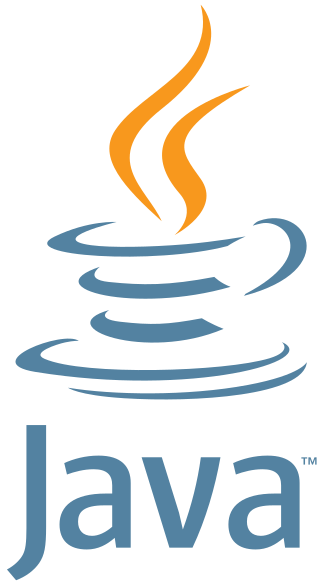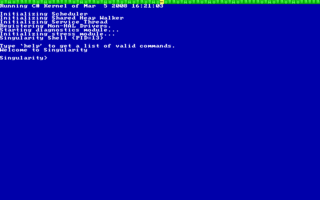
Java is a high-level, class-based, object-oriented programming language that is designed to have as few implementation dependencies as possible. It is a general-purpose programming language intended to let programmers write once, run anywhere (WORA), meaning that compiled Java code can run on all platforms that support Java without the need to recompile. Java applications are typically compiled to bytecode that can run on any Java virtual machine (JVM) regardless of the underlying computer architecture. The syntax of Java is similar to C and C++, but has fewer low-level facilities than either of them. The Java runtime provides dynamic capabilities that are typically not available in traditional compiled languages. As of 2019, Java was one of the most popular programming languages in use according to GitHub, particularly for client–server web applications, with a reported 9 million developers.
Java and C++ are two prominent object-oriented programming languages. By many language popularity metrics, the two languages have dominated object-oriented and high-performance software development for much of the 21st century, and are often directly compared and contrasted. Java’s syntax was based on C/C++.
Cocoa is Apple's native object-oriented application programming interface (API) for its desktop operating system macOS.

In computer science, a library is a collection of non-volatile resources used by computer programs, often for software development. These may include configuration data, documentation, help data, message templates, pre-written code and subroutines, classes, values or type specifications. In IBM's OS/360 and its successors they are referred to as partitioned data sets.
In computing, just-in-time (JIT) compilation is a way of executing computer code that involves compilation during execution of a program rather than before execution. This may consist of source code translation but is more commonly bytecode translation to machine code, which is then executed directly. A system implementing a JIT compiler typically continuously analyses the code being executed and identifies parts of the code where the speedup gained from compilation or recompilation would outweigh the overhead of compiling that code.
Managed Extensions for C++ or Managed C++ is a now-deprecated set of language extensions for C++, including grammatical and syntactic extensions, keywords and attributes, to bring the C++ syntax and language to the .NET Framework. These extensions were created by Microsoft to allow C++ code to be targeted to the Common Language Runtime (CLR) in the form of managed code, as well as continue to interoperate with native code.

Singularity is an experimental operating system developed by Microsoft Research between July 9, 2003, and February 7, 2015. It was designed as a high dependability OS in which the kernel, device drivers, and application software were all written in managed code. Internal security uses type safety instead of hardware memory protection.
Jikes Research Virtual Machine is a mature virtual machine that runs programs written for the Java platform. Unlike most other Java virtual machines (JVMs), it is written in the programming language Java, in a style of implementation termed meta-circular. It is free and open source software released under an Eclipse Public License.
In computer programming, a runtime system or runtime environment is a sub-system that exists both in the computer where a program is created, as well as in the computers where the program is intended to be run. The name comes from the compile time and runtime division from compiled languages, which similarly distinguishes the computer processes involved in the creation of a program (compilation) and its execution in the target machine.

C# is a general-purpose high-level programming language supporting multiple paradigms. C# encompasses static typing, strong typing, lexically scoped, imperative, declarative, functional, generic, object-oriented (class-based), and component-oriented programming disciplines.

Java is a set of computer software and specifications developed by James Gosling at Sun Microsystems that provides a system for developing application software and deploying it in a cross-platform computing environment. Java is used in a wide variety of computing platforms from embedded devices and mobile phones to enterprise servers and supercomputers. Java applets, which are less common than standalone Java applications, were commonly run in secure, sandboxed environments to provide many features of native applications through being embedded in HTML pages.
In software development, the programming language Java was historically considered slower than the fastest 3rd generation typed languages such as C and C++. The main reason being a different language design, where after compiling, Java programs run on a Java virtual machine (JVM) rather than directly on the computer's processor as native code, as do C and C++ programs. Performance was a matter of concern because much business software has been written in Java after the language quickly became popular in the late 1990s and early 2000s.
In computer science, ahead-of-time compilation is the act of compiling an (often) higher-level programming language into an (often) lower-level language before execution of a program, usually at build-time, to reduce the amount of work needed to be performed at run time.
Eclipse OpenJ9 is a high performance, scalable, Java virtual machine (JVM) implementation that is fully compliant with the Java Virtual Machine Specification.
Dryad was a research project at Microsoft Research for a general purpose runtime for execution of data parallel applications. The research prototypes of the Dryad and DryadLINQ data-parallel processing frameworks are available in source form at GitHub.

The .NET Framework is a proprietary software framework developed by Microsoft that runs primarily on Microsoft Windows. It was the predominant implementation of the Common Language Infrastructure (CLI) until being superseded by the cross-platform .NET project. It includes a large class library called Framework Class Library (FCL) and provides language interoperability across several programming languages. Programs written for .NET Framework execute in a software environment named the Common Language Runtime (CLR). The CLR is an application virtual machine that provides services such as security, memory management, and exception handling. As such, computer code written using .NET Framework is called "managed code". FCL and CLR together constitute the .NET Framework.
Windows Runtime (WinRT) is a platform-agnostic component and application architecture first introduced in Windows 8 and Windows Server 2012 in 2012. It is implemented in C++ and officially supports development in C++, Rust/WinRT, Python/WinRT, JavaScript-TypeScript, and the managed code languages C# and Visual Basic .NET (VB.NET).

Mono is a free and open-source .NET Framework-compatible software framework. Originally by Ximian, it was later acquired by Novell, and is now being led by Xamarin, a subsidiary of Microsoft and the .NET Foundation. Mono can be run on many software systems.
Verve is a research operating system developed by Microsoft Research. Verve is verified end-to-end for type safety and memory safety.

Kathryn S. McKinley is an American computer scientist noted for her research on compilers, runtime systems, and computer architecture. She is also known for her leadership in broadening participation in computing. McKinley was co-chair of CRA-W from 2011 to 2014.







